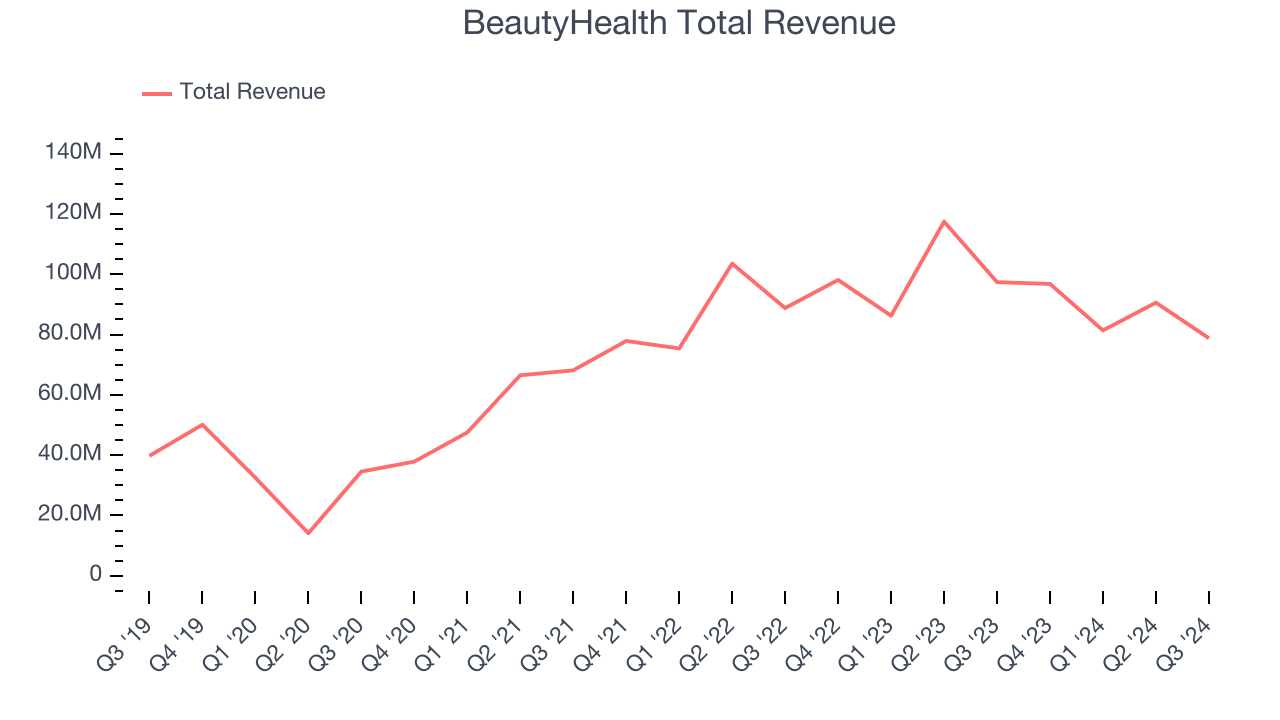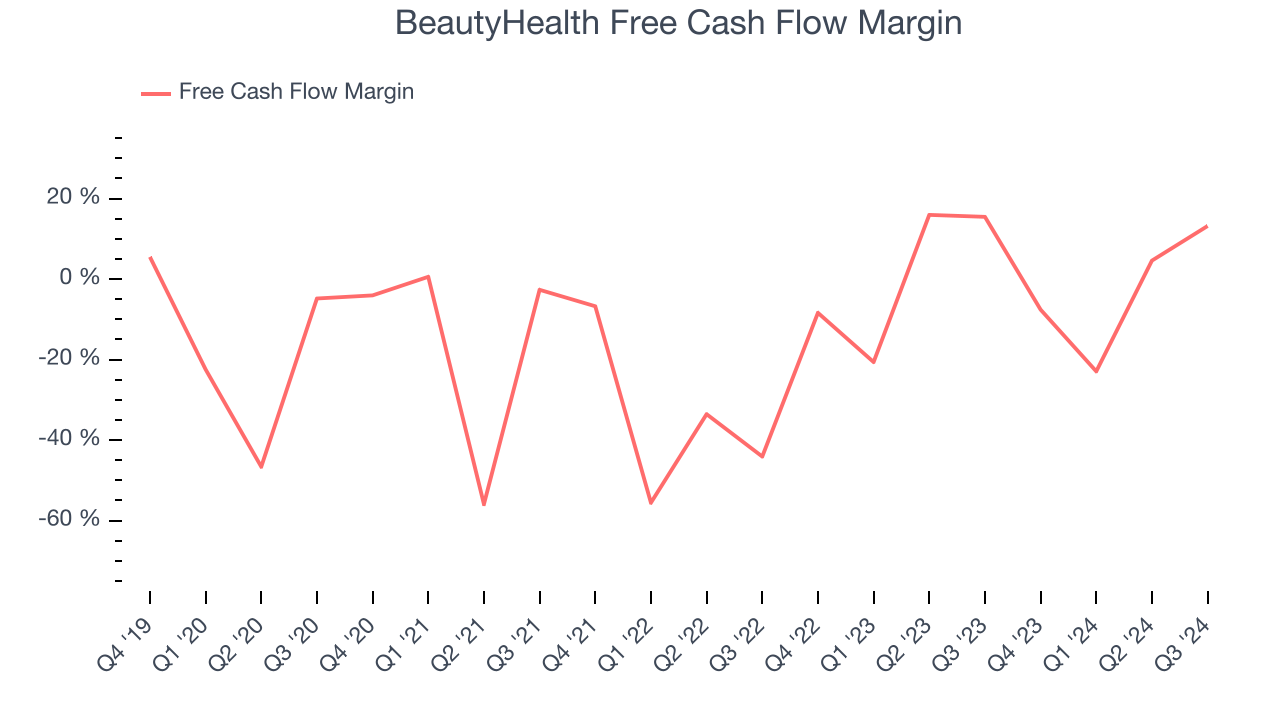
Skincare company BeautyHealth (NASDAQ:SKIN) announced better-than-expected revenue in Q3 CY2024, but sales fell 19.1% year on year to $78.8 million. On the other hand, the company’s full-year revenue guidance of $327 million at the midpoint came in 4.1% below analysts’ estimates. Its GAAP loss of $0.15 per share was 55.2% below analysts’ consensus estimates.
Is now the time to buy BeautyHealth? Find out by accessing our full research report, it’s free.
BeautyHealth (SKIN) Q3 CY2024 Highlights:
- Revenue: $78.8 million vs analyst estimates of $76.82 million (2.6% beat)
- EPS: -$0.15 vs analyst estimates of -$0.10 (-$0.05 miss)
- EBITDA: $8.1 million vs analyst estimates of -$4.75 million (271% beat)
- The company dropped its revenue guidance for the full year to $327 million at the midpoint from $335 million, a 2.4% decrease
- EBITDA guidance for the full year is $1 million at the midpoint, above analyst estimates of -$7.11 million
- Gross Margin (GAAP): 51.5%, up from -12.9% in the same quarter last year
- Operating Margin: -27.3%, up from -84.3% in the same quarter last year
- EBITDA Margin: 10.3%, in line with the same quarter last year
- Free Cash Flow Margin: 13.2%, down from 15.5% in the same quarter last year
- Market Capitalization: $218.3 million
“We delivered revenue above the midpoint of our guidance, with growth in consumables sales driven by sustained demand for Hydrafacial treatments and the successful launch of the Hydralock HA Booster,” said BeautyHealth Chief Executive Officer Marla Beck.
Company Overview
Operating in the emerging beauty health category, the appropriately named BeautyHealth (NASDAQ:SKIN) is a skincare company best known for its Hydrafacial product that cleanses and hydrates skin.
Personal Care
While personal care products products may seem more discretionary than food, consumers tend to maintain or even boost their spending on the category during tough times. This phenomenon is known as "the lipstick effect" by economists, which states that consumers still want some semblance of affordable luxuries like beauty and wellness when the economy is sputtering. Consumer tastes are constantly changing, and personal care companies are currently responding to the public’s increased desire for ethically produced goods by featuring natural ingredients in their products.
Sales Growth
Reviewing a company’s long-term performance can reveal insights into its business quality. Any business can have short-term success, but a top-tier one sustains growth for years.
BeautyHealth is a small consumer staples company, which sometimes brings disadvantages compared to larger competitors benefitting from economies of scale. On the other hand, it can grow faster because it’s working from a smaller revenue base and has a longer runway of untapped store chains to sell into.
As you can see below, BeautyHealth grew its sales at an impressive 16.5% compounded annual growth rate over the last three years. This shows it had good demand, a useful starting point for our analysis.

This quarter, BeautyHealth’s revenue fell 19.1% year on year to $78.8 million but beat Wall Street’s estimates by 2.6%.
Looking ahead, sell-side analysts expect revenue to grow 6% over the next 12 months, a deceleration versus the last three years. This projection is still above average for the sector and implies the market is baking in some success for its newer products.
Unless you’ve been living under a rock, it should be obvious by now that generative AI is going to have a huge impact on how large corporations do business. While Nvidia and AMD are trading close to all-time highs, we prefer a lesser-known (but still profitable) semiconductor stock benefitting from the rise of AI. Click here to access our free report on our favorite semiconductor growth story.
Cash Is King
Free cash flow isn't a prominently featured metric in company financials and earnings releases, but we think it's telling because it accounts for all operating and capital expenses, making it tough to manipulate. Cash is king.
BeautyHealth broke even from a free cash flow perspective over the last two years, giving the company limited opportunities to return capital to shareholders.
Taking a step back, we can see that BeautyHealth’s margin dropped by 5.2 percentage points during that time. Almost any movement in the wrong direction is undesirable because of its already low cash conversion.

BeautyHealth’s free cash flow clocked in at $10.4 million in Q3, equivalent to a 13.2% margin. The company’s cash profitability regressed as it was 2.3 percentage points lower than in the same quarter last year, but it’s still above its two-year average. We wouldn’t put too much weight on this quarter’s decline because investment needs can be seasonal, causing short-term swings. Long-term trends are more important.
Key Takeaways from BeautyHealth’s Q3 Results
We were impressed by how significantly BeautyHealth blew past analysts’ EBITDA and EBITDA guidance expectations this quarter - the company turned a profit while Wall Street predicted a loss. We were also glad its revenue beat estimates. Overall, this was a softer good quarter. The stock traded up 17.1% to $1.99 immediately following the results.
So should you invest in BeautyHealth right now? When making that decision, it’s important to consider its valuation, business qualities, as well as what has happened in the latest quarter. We cover that in our actionable full research report which you can read here, it’s free.
